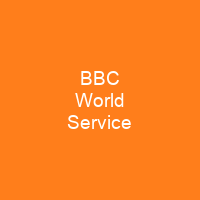The BBC World Service: A Beacon of Global Information
Imagine a world where news, insights, and discussions flow freely across continents, languages, and cultures. That’s exactly what the BBC World Service aims to achieve. Owned and operated by the British Broadcasting Corporation (BBC), this international broadcaster has been shaping global conversations for over 90 years.
The Origins of a Global Voice
When did it all begin? The BBC World Service traces its roots back to December 19, 1932, when it was first known as the BBC Empire Service. Its mission then was simple yet profound: to connect English speakers across the British Empire. But as history unfolded, so did the service’s reach and purpose.
From Propaganda to Peace
During World War II, the BBC expanded its foreign-language services, broadcasting in Arabic, German, Italian, and French. These broadcasts were not just news; they were a form of propaganda against Nazi rule. The service was bolstered by a dedicated European Service from 1941, further cementing its role as a global voice.
Evolution Through the Decades
How has it changed over time? Since the post-World War II era, the BBC World Service has undergone significant transformations. It expanded its reach but also faced challenges such as censorship and financial pressures. In the 1950s and 1960s, despite attempts by governments to restrict or discontinue services, it continued to broadcast in multiple languages.
By the end of the century, many broadcasts were discontinued due to declining audience numbers and increased access to the internet. The 21st century brought further challenges, including government interference and financial cuts. In 2005, plans were announced to discontinue some language services to finance new television news services.
Adapting to a Digital Age
How has it adapted? The service transformed from a mainly radio-based operation to multi-media starting in 2010. In recent years, concerns over the BBC’s independence and its ability to operate freely around the world have emerged. Despite these challenges, the BBC World Service continues to evolve.
In January 2011, some services were closed due to financial constraints and widespread access to international information. This led to job cuts and the elimination of shortwave transmissions for some languages. By 2012, London staff had moved to Broadcasting House, with about 35% of staff based overseas in 2014.
Global Reach and Formats
How does it reach its audience? The BBC World Service broadcasts from Broadcasting House in London, containing radio and television studios for use by overseas language services. It has eight regional feeds, two online-only streams, and broadcasts 24 hours a day.
The service offers an English 24-hour global radio network and separate services in 27 other languages, with news and information available on the BBC website and through various apps and platforms. The World Service uses several tunes and sounds to represent the station, including the iconic ‘This is London’ phrase.
Technical Aspects
How does it transmit its signals? Traditionally, the service relied on shortwave broadcasts to overcome barriers of censorship, distance, and spectrum scarcity. The BBC has maintained a worldwide network of shortwave relay stations since the 1940s, mainly in former British colonies.
With the advent of satellite distribution, local stations can now relay BBC programmes. The World Service is not regulated by Ofcom as the BBC generally is; instead, it is funded by a mixture of the UK’s television licence fee, limited advertising profits, and Foreign, Commonwealth and Development Office funding.
Programming and Audience
What kind of programming does it offer? The English language service mainly broadcasts news and analysis. Mainstays include Newsday, Newshour, and The Newsroom. Daily science programmes like Health Check and Science in Action are also part of the schedule.
Sportsworld broadcasts live commentary of Premier League football matches on weekends, while other weekend shows include The Sports Hour and Stumped, a cricket programme co-produced with All India Radio and the Australian Broadcasting Corporation. Human interest programming such as Outlook is also featured.
Global Audience
Who listens? The largest audiences are in English, Hindi, Urdu, Nepali, Bengali, Sinhala, Tamil, Marathi, and other major languages of South Asia, where BBC broadcasters are household names. The World Service is available up to eighteen hours a day in English across most parts of Asia and in Arabic for the Middle East.
The service has relays in Afghanistan, Iraq, Singapore, Hong Kong (pre-ban), Philippines, Japan, Korea, Berlin, Ceske Budjovice, Karlovy Vary, Plzen, Usti nad Labem, Zlin, Prague, Pristina, Riga, Tallinn, Tirana, and Vilnius. The BBC World Service has been jammed by the Soviet Union, Iran, Iraq, Myanmar/Burma, and China.
Technical Details
How does it broadcast? The BBC World Service broadcasts on various frequencies and platforms around the world, including shortwave relays from Singapore and local networks in New Zealand and Australia. It is also available on digital platforms such as DAB, Freeview, Virgin Media, Sky, and BBC Sounds.
The station uses several interval signals, including morse code, and has introduced new ones over time. The network operates using Greenwich Mean Time and announces the time on the hour. In 2022, the Financial Times stated that the BBC World Service is considered a pillar of British soft power.
Conclusion
The BBC World Service stands as a testament to the enduring power of information in shaping global perspectives. From its humble beginnings to its current status as a respected voice in international broadcasting, it continues to navigate the complex landscape of global communication. As we move forward, the service will undoubtedly face new challenges and opportunities, but one thing remains certain: its mission to inform, educate, and entertain audiences worldwide is more vital than ever.

You want to know more about BBC World Service?
This page is based on the article BBC World Service published in Wikipedia (retrieved on November 27, 2024) and was automatically summarized using artificial intelligence.






